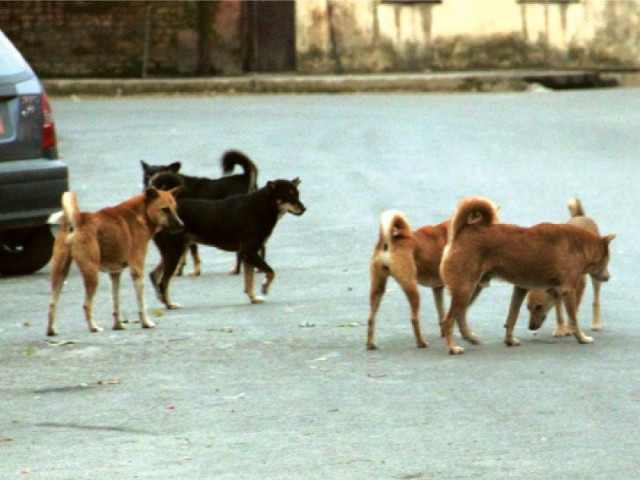Another dog bite victim dies in JPMC
Despite 200,000 attacks this year, Sindh govt has not yet started its drive to control stray dog population

PHOTO: EXPRESS
Imam Bux, a 36-year-old resident of Tando Allahyar, was brought to Jinnah Postgraduate Medical Centre (JPMC) on Sunday in critical condition. He died during treatment on Monday.
Speaking to The Express Tribune, Dr Seemin Jamali, the JPMC executive director, said that the man was brought in with a history of being bitten by a dog. She said that the deceased had hydrophobia and was having delusions during his treatment. "He was unable to share what animal had attacked him," she added.
Dr Jamali said that according to the history the family shared with the hospital, the man had been attacked by a stray dog about five years ago. "There is no record of whether he was properly vaccinated and treated at the time," she explained.
Every hour, dogs bite 26 people in Sindh
Imam Bux was a farmer and poverty had even rendered his family unable to transport the body back to Tando Allahyar by themselves. JPMC arranged an ambulance for the family who shifted it to the village.
According to the JPMC records, over 10,800 dog-bite patients have been treated at the facility since January, of which 11 patients have died during treatment. A total of 25 dog-bite victims have died across the province this year.
Meanwhile, Dr Khadim Hussain Qureshi, the medical superintendent at Dr Ruth Pfau Civil Hospital, said that not a single dog bite victim has died at his facility in the current year. He added that at least 80 dog-bite patients had been vaccinated and treated at the hospital. "We have even had patients from Balochistan brought to our hospital," he added.
Waiting for action
A senior official in the Sindh government, who refused to share further details about the project, told The Express Tribune that the project planned to control the stray dog population in Sindh had not yet been started. "Only the summary of the project has been submitted [in the Sindh Chief Minister House]," he said, on the condition of anonymity.
Last month, as the number of people bitten by dogs rose, the provincial government announced that it would initiate the project in Karachi's Central district. As part of this project, municipal employees were to be trained to catch stray dogs, vaccinate them against rabies and sterilise them in order to prevent their population from increasing further.
"Unfortunately, the old method of killing the dogs with poison is still being used," the official disclosed.
The official did not share more details about the project, saying all officials of the Sindh government have been directed not to speak with the media.
According to project documents, the programme is to be launched by the Sindh local government department with the help of non-governmental organisations, community members and other stakeholders. For the project, the government has decided to vaccinate and subsequently sterilise a total of 500,000 stray dogs within a year in efforts to reduce their population.
Rabies epidemic: Mad dog unleashes biting terror in Karachi
Official reports said that over the last 11 months, around 200,000 people have been attacked by stray dogs in Sindh.
Taking notice of the situation, the Sindh High Court (SHC) initially directed the relevant authorities to control the population of stray dogs. On Friday, an SHC bench expressed its annoyance at the Sindh government over its delay in taking action against incidents involving stray dogs and directed the relevant agencies to set up a task force, a complaint cell and a helpline. It also took notice of an attack on six-year-old Hasnain Bughio, who was mauled by half a dozen dogs in Larkana and died while receiving treatment in Karachi.
Published in The Express Tribune, December 24th, 2019.



















COMMENTS
Comments are moderated and generally will be posted if they are on-topic and not abusive.
For more information, please see our Comments FAQ